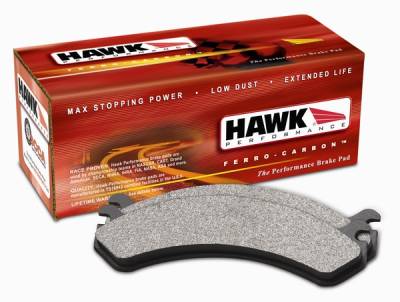Home - Return to Previous Page
Pontiac Formula Hawk SuperDuty Brake Pads - HB119P594
HB119P594
SuperDuty - Severe-Duty Truck Brake Pad Compound
Extreme Braking for Extreme Payloads
Hawk's SuperDuty Ferro-Carbon material is engineered for severe-duty professional truck fleets and trucks and SUVs towing heavy loads. This material offers unmatched braking performance under high inertia and/or repetitive braking applications.
To drive safely with heavy payloads it is critical to have brakes that operate properly. Heavy fleet trucks and light trucks and SUVs carrying heavy tow loads experience high braking temperatures. Higher temperatures contribute to premature brake pad and rotor wear. Hawk Performance's SuperDuty product is a sophisticated material that has an extremely high coefficient of friction designed to provide maximum truck and SUV stopping power with excellent high temperature heat dissipation.
Upgrade your fleet or tow vehicle's braking performance with Hawk Performance's SuperDuty, Sever-Duty compound!
Key Features:
Extremely high coefficient of friction Extremely high fade resistance
Recommended for professional fleets (greater than 1 ton) and light trucks towing excessive payloads.
Superior high temperature rotor and pad wear performance.
Extreme Braking for Extreme Payloads
Hawk's SuperDuty Ferro-Carbon material is engineered for severe-duty professional truck fleets and trucks and SUVs towing heavy loads. This material offers unmatched braking performance under high inertia and/or repetitive braking applications.
To drive safely with heavy payloads it is critical to have brakes that operate properly. Heavy fleet trucks and light trucks and SUVs carrying heavy tow loads experience high braking temperatures. Higher temperatures contribute to premature brake pad and rotor wear. Hawk Performance's SuperDuty product is a sophisticated material that has an extremely high coefficient of friction designed to provide maximum truck and SUV stopping power with excellent high temperature heat dissipation.
Upgrade your fleet or tow vehicle's braking performance with Hawk Performance's SuperDuty, Sever-Duty compound!
Key Features:
Recommended for professional fleets (greater than 1 ton) and light trucks towing excessive payloads.
Superior high temperature rotor and pad wear performance.
Was:
$82.99
Sale:
$72.99
Save:
12%
Save:
$10.00
Description
Extreme Braking for Extreme Payloads!
Available in Front Pads
Fits: 1982-1988 Pontiac Formula with Rear Disc Brakes (1st Design)
Available in Front Pads
Fits: 1982-1988 Pontiac Formula with Rear Disc Brakes (1st Design)
Installation
Pontiac Formula Hawk SuperDuty Brake Pads - HB119P594 Fits:
1982-1988 Pontiac Formula with Rear Disc Brakes (1st Design)
Brake Pad Installation Procedure
1. Install brake pads properly. Be sure pads are securely positioned in the caliper.
2. Flush system with fresh brake fluid.
3. Check all hydraulic parts for excess wear and tear.
4. Check disc for proper thickness, parallelism, and lateral runout.
5. Check disc for scoring or grooves over .012"depth. If either applies, resurfacing is required.
6. If discs do not need resurfacing, then contamination from the previous brake pads must be removed. Sand discs with 130 grit sandpaper using moderate pressure. Use soap and water to clean discs' surface after sanding and machining. Discs should be free and clear of oil, grease, and brake fluid.
7. Inspect calipers for freedom of movement. Lubricate where necessary.
Burnishing Instructions
1. After installing new brake pads, make 6 to 10 stops from approximately 30-35 mph applying moderate pressure.
2. Make an additional 2 to 3 hard stops from approximately 40 to 45 mph.
3. Be sure to not drag brakes!
4. Allow 15 minutes for brake system to cool down.
5. After step 4 your new pads are ready for use.
1982-1988 Pontiac Formula with Rear Disc Brakes (1st Design)
Brake Pad Installation Procedure
1. Install brake pads properly. Be sure pads are securely positioned in the caliper.
2. Flush system with fresh brake fluid.
3. Check all hydraulic parts for excess wear and tear.
4. Check disc for proper thickness, parallelism, and lateral runout.
5. Check disc for scoring or grooves over .012"depth. If either applies, resurfacing is required.
6. If discs do not need resurfacing, then contamination from the previous brake pads must be removed. Sand discs with 130 grit sandpaper using moderate pressure. Use soap and water to clean discs' surface after sanding and machining. Discs should be free and clear of oil, grease, and brake fluid.
7. Inspect calipers for freedom of movement. Lubricate where necessary.
Burnishing Instructions
1. After installing new brake pads, make 6 to 10 stops from approximately 30-35 mph applying moderate pressure.
2. Make an additional 2 to 3 hard stops from approximately 40 to 45 mph.
3. Be sure to not drag brakes!
4. Allow 15 minutes for brake system to cool down.
5. After step 4 your new pads are ready for use.
Details
- HB119P594
- HB119P594
- Hawk
- New
Categories
- Car Parts - Brakes - Brake Pads
- Formula - Brakes - Brake Pads
Shipping Information
- Item Requires Shipping
- $24.99

